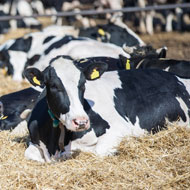
Mycobacterium Microti infection confirmed in a cow in France
Scientists have confirmed a case of Mycobacterium Microti infection in a cow in France, raising concern over the reliability of diagnostic tests used for bovine TB (bTB) surveillance.
Reporting in Veterinary Record (Vol 180 No 17), researchers say the discovery follows an investigation of M Microti infection in a dairy goat in the same region.
Communicating the finding in 2015, the team demonstrated that the bacteria could be responsible for misleading diagnostic results for bTB.
In this latest study, researchers found that the suspected cattle herd had shared the same pasture with two bTB confirmed herds. As such, they submitted the herd for testing and culled one animal ‘with a doubtful result’ for direct diagnosis.
An analysis revealed the cow harboured the same genotype of M microti that was identified in the goat, as well as a badger that was living in the same area.
M Microti is a member of the Mycobacterium tuberculosis complex (MTBC), which also includes major human and animal pathogens like M tuberculosis and Mycobacterium bovis. It was first described as the cause of tuberculosis in small wild mammals, but it can also infect other species - including humans.
Previously in the UK, M microti has been isolated in skin test reactor cattle, demonstrating the risk of infection in livestock and of interference with bTB diagnosis. The researchers believe that all these findings raise concerns about the reliability of diagnostic tests used for bTb surveillance.
‘The use of highly specific tests based on specific antigens such as ESAT6 and CFP10 (which are absent in M microti and already currently used in the interferon gamma test employed in France) are highly recommended to accurately identify M Bovis infection at antemortem examination,’ they write.
'At postmortem diagnosis, the use of specific molecular tools should be considered to rapidly distinguish pathogens within the MTBC and to avoid misleading diagnosis’.
The research was led by scientists from ANSES - the French agency for Food, Environmental and Occupational Health & Safety.



 The BSAVA has opened submissions for the BSAVA Clinical Research Abstracts 2026.
The BSAVA has opened submissions for the BSAVA Clinical Research Abstracts 2026.